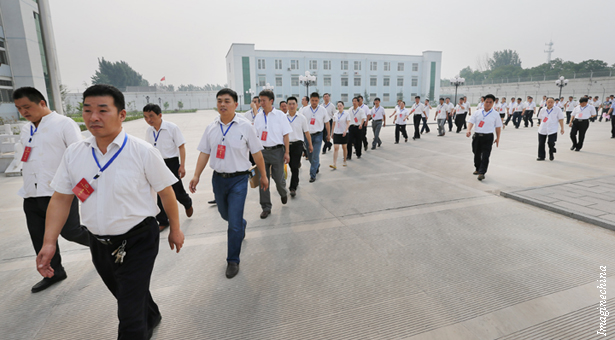Local cadres should consider re-enrolling in the Party School. Because President Xi Jinping is issuing a new textbook on how leaders in cities and towns will be appraised in the future.
For decades, officials that boosted GDP growth in their jurisdiction have been handsomely rewarded with promotions. Much less thought has been given to whether that growth has translated into better living standards for residents, or simply added to environmental degradation.
This grading system could change soon. Xi said on Saturday that officials will need to do more than increase the economic output in the areas they oversee, according to state news agency Xinhua. Complete coursework on how performance will be tallied in the future isn’t available yet. But Xi, who has been at the head of the government for about 100 days, said social development and the quality of the environment will be taken into account before cadres get much sought after promotions.
The comment resonates with a tone that’s been struck repeatedly during the past months of slowing growth: That the China model is sputtering and debt is mounting on rampant development. Official behavior has often stoked the ills of development.
Since the early days of reform, the central government has used three metrics to appraise locals cadres, according to a Standard Chartered report issued in May. China’s some 10 million local leaders have been asked to maintain social stability, boost education and cultural activities, all the while making absolutely sure the economy is pulsating.
The last requirement has certainly been the most important. “Economic reform policy during the 1980s and early 1990s can be broadly summed up by one instruction to the localities, particularly the cities: Get on with it,” the StanChart report says. In other words, make the economy grow.
And so Chinese cities have thrived. Officials keen on promotions have made sure skyscrapers are raised, freeways are paved and housing projects spread like weeds. But the rapid-fire development has led to problems.
Not all cities and towns can accomodate such fast-paced growth. If factories are built in a town that isn’t suitable for manufacturing, it will quickly accumulate debt, StanChart pointed out. This shortsighted investment accounts in part for an increasingly high debt-to-GDP ratio in China.
Officials also have to raise money if they want to fund huge projects such as stadiums and airports. Land sales have helped generate much of the revenue local governments use on these works, but they have driven the cost of property in some cities far beyond individual income growth.
Often the local government will tighten the supply of land with the sole purpose of driving up prices, earning them higher profits in the end.
A leader who doubles land revenue will increase his or her chances of promotion by 40%, according to StanChart.
This isn’t the first time Xi has chimed in on China’s flawed economic model. Last month, he said the government was no longer willing to sacrifice the environment for pretty GDP figures.
Xi should legitimize this new outlook on local growth by better articulating the standards to which cadres will be held. Standard Chartered had a few suggestions. A greater focus on improving education would be a start. Although results aren’t instantaneous, this jump in human capital would eventually push up economic growth.
Taking a count of how many jobs an official can create would be another good measure of performance, especially employment in the services sector, which is underdeveloped in China.
Local officials shouldn’t feel too put out. While Xi pushed for a new measure on productivity, he also reminded the Communist Party that it should return to the principles of Marxism. The grading system might be changing, but the cadres can rest assured that the report card is still red.
